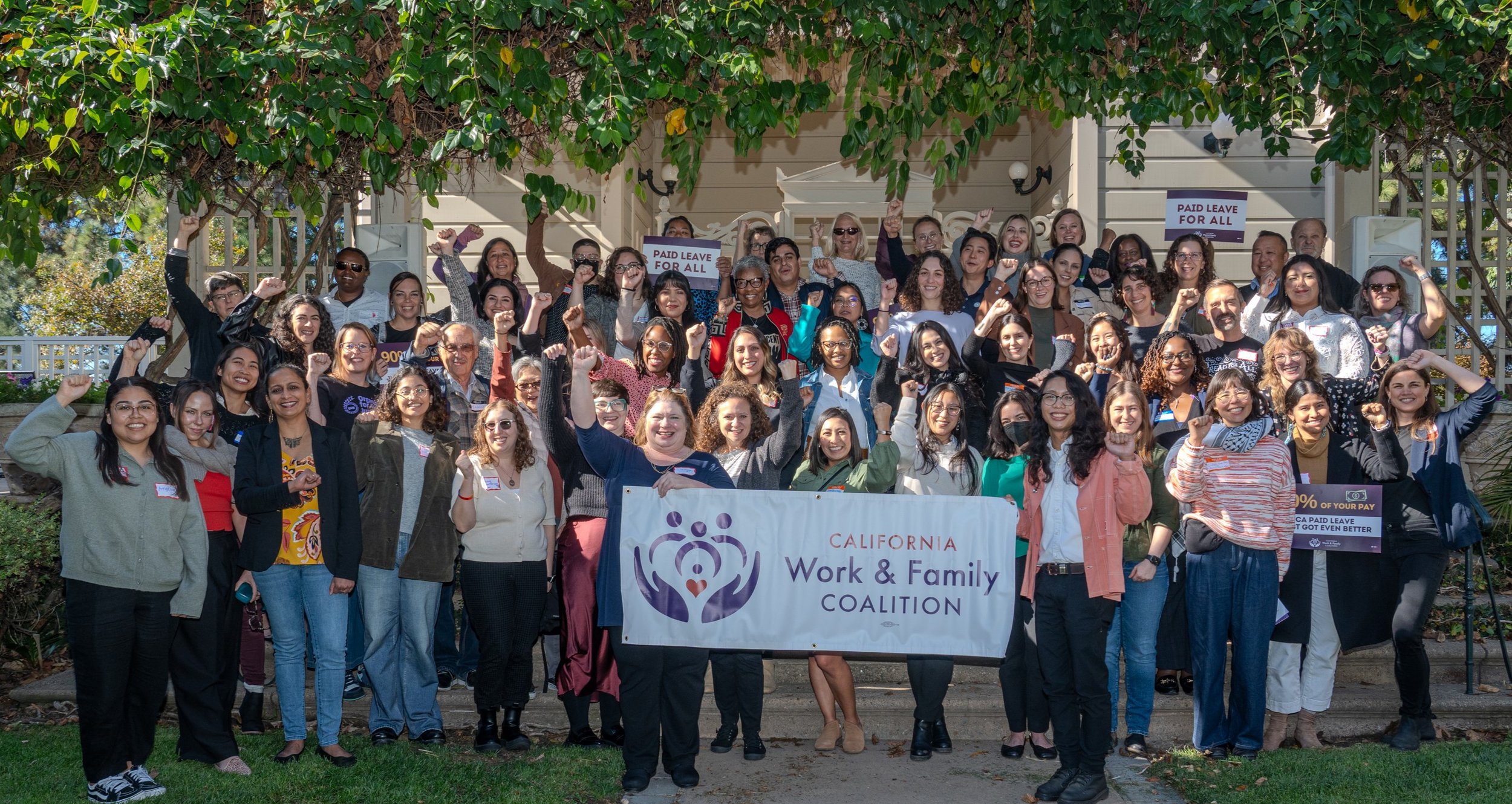
Join the Movement for Paid Leave for All!
Below are the policy proposals we are advocating for this year.
California State Priorities
1 |Paid Family Leave for Chosen Family:
SB 590 (Durazo)
-Top Priority-
Update California's Paid Family Leave program so Californians can care for their seriously ill chosen or extended family members.
Status: Referred to the Senate Labor Committee.
Almost all private sector and some public sector California workers pay into the State Disability Insurance Fund, which funds California’s Paid Family Leave (PFL) program. PFL provides partial income replacement for qualifying California workers who must take time away from work to care for a seriously ill family member or to bond with a new child.
However, California’s Paid Family Leave program reflects an outdated family model, only allowing workers to receive partial income replacement to care for a narrowly defined list of family members. This definition leaves out both chosen family and extended family members such as aunts, uncles, cousins, nieces and nephews.
Outdated family definitions disproportionately affect California’s LGBTQ+ community, which is the largest of any state in the United States. Many LGBTQ+ adults, especially older adults, do not have accessible relationships with biological relatives. A survey conducted by AARP showed that of LGBTQ people 45 and older, 82 percent are concerned about having adequate family or social support as they age. California also has a higher percentage of extended families living in multigenerational households.
California made important progress in 2022 when the state legislature enacted AB 1041 (Wicks), which allows workers to use job-protected caregiving leave under the California Family Rights Act (CFRA) and paid sick leave to care for a member of their chosen or extended family.
SB 590 (Durazo), authored by Senator María Elena Durazo, will continue important work in this area by ensuring that workers can access the Paid Family Leave benefits they already pay for to care for a member of their chosen or extended family.
Do you have an experience to share about needing to care for a family member who is not currently covered by Paid Family Leave? Share your experience here!
2| California Workplace Outreach Program (CWOP):
SB 578 (Smallwood-Cuevas)
Make the California Workplace Outreach Program (CWOP) permanent and expand it to include paid leave and discrimination protections.
Status: Referred to the Senate Labor Committee.
The California Workplace Outreach Program (CWOP) is a partnership between state labor agencies and “trusted messenger” organizations, to confront the ongoing crisis of wage theft and retaliation and the immediate threat to immigrant workers posed by the federal government.
SB 578 (Smallwood-Cuevas) will write CWOP into our Labor Code, marking it as an ongoing commitment to ensure that every working Californian can understand and assert their rights at work.
SB 578 (Smallwood-Cuevas) would also expand the scope of CWOP to include workplace rights administered by the Employment Development Department (EDD), including Paid Family Leave, Disability Insurance, and Unemployment Insurance; and the Civil Rights Department (CRD), which protects the rights of Californians to work without discrimination or harassment based on sex, race, ethnicity, language, and other protected characteristics. This expanded scope will enable trusted messenger organizations to help workers with all their employment rights. Of particular note is the urgent need for outreach on Paid Family Leave and Disability Insurance benefits, which are newly accessible to workers in low-wage industries. As of January 1, 2025, the wage replacement rate for workers earning low wages has increased to 90%, making it far more likely workers paid low wages can take leave to heal from an injury, care for an ill family member, recover from childbirth, or bond with a new baby. Workers must know about this change so they can access the improved benefits.
3| Pregnancy Leave for Educators:
AB 65 (Aguiar-Curry)
Create Pregnancy Leave for California School Educators.
Status: Passed out of the Assembly Education Committee.
Most California school employees do not qualify for paid pregnancy leave. When school employees get pregnant they must first exhaust their sick leave before accessing partial pay, the amount that is left over after their substitute has been paid. This can have long-lasting impacts, including reducing future retirement benefits since unused sick leave can be converted to retirement credits when school employees retire. AB 65 (Aguiar-Curry), introduced by Assemblymember Aguiar-Curry, would grant school employees up to 14 weeks of leave with full pay, paid for by the employer, when an employee is experiencing or has experienced pregnancy, miscarriage, childbirth, termination of pregnancy, or recovery from those conditions.
Do you have an experience to share about not having pregnancy leave as a school employee? Share your experience here!
How does the Coalition choose their legislative priorities?
Legislation that reflects our mission, vision, and values statements are discussed and considered by all Coalition members at our Annual Statewide Meeting. Then, members take a vote on the legislation to choose our priorities for the year.
What does a “top priority” bill mean?
You might have noticed that one of the bills on this page are labeled “Top Priority.” This means that the Coalition will be leading campaigns on those bills. For the other bills, the Coalition will be playing a supporting role, meaning that other amazing Coalition members will be leading those campaigns, and we will be sharing out and taking action on the work created by those campaign leaders. We consider organizational capacity when making these decisions so that each legislative priority gets a fair and equal amount of resources and support.


